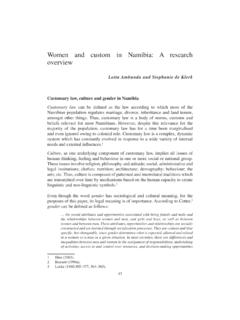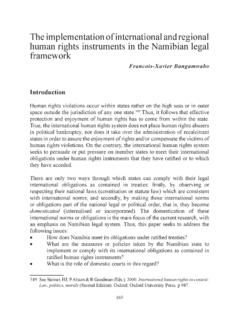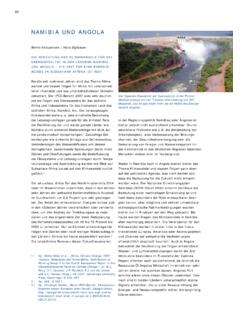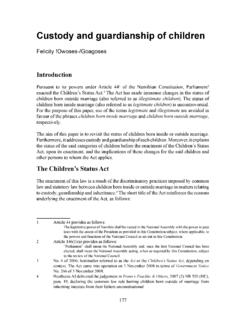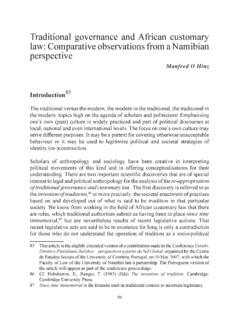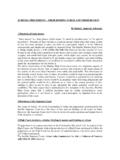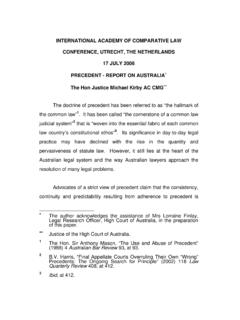Transcription of Constitutional supremacy or parliamentary …
1 251 Constitutional supremacy or parliamentary sovereignty through back doors: Understanding Article 81 of the Namibian ConstitutionFrancois X BangamwaboIntroductionBefore Independence, Namibia (then South West Africa/SWA) applied the Westminster system of government, that is, parliamentary sovereignty . This system was imported from South Africa1 into SWA by the Administration of Justice Proclamation, No. 21 of Under parliamentary sovereignty , the legislature is empowered to make or repeal any law whatsoever on any subject, with no corresponding competence on the courts to question the validity of any law so good example of the application of sovereignty of Parliament is the United Kingdom (UK).
2 In the Constitution of the United Kingdom, the courts are bound to take the validity of every Act of Parliament for granted, and there could be no question of non-compliance with any constitutionally prescribed procedure. Therefore, the UK Parliament is not only sovereign but also supreme, there is no law to which it is subject as regards either the content of its power or the procedure for exercising it, and it is this supremacy that excludes the supremacy of the opposite of parliamentary sovereignty is Constitutional supremacy . The supremacy of the Constitution demands that the court should hold void any exercise of power (either by the executive or legislature) which does not comply with the prescribed manner and form or which is otherwise not in accordance with the Constitution from which the power Whilst the supremacy of the Constitution can coexist with the sovereignty of Parliament, the former necessarily excludes the attainment of political independence, Namibia discarded the sovereignty of Parliament, and rather opted for the supremacy of the Constitution.
3 Article 1(6) of the 1 It is noteworthy that South Africa has since discarded this system with the new Constitutional order which came into existence in the mid-1990s after democratic elections which put an end to the horrendous system of apartheid. See ruling by Mohamed, then CJ, in Speaker of the National Assembly v De Lille 1999 (4) SA Briefly, the effect of this Proclamation was to introduce both Roman Dutch Law and Anglo Saxon common law as they were applied in the then Union of South Africa. For more on this, see Tshosa (2010:7). See also the ruling by Claassen JP, as he then was, in R v Goseb, 1956 (1) SA (SWA), at Wheare (1954:8).4 (ibid.:10).252 Constitution of the Republic of Namibia provides for the supremacy of the Constitution over all other laws.
4 The implication of the supremacy clause is that any law enacted by the legislature or any action taken by the executive must comply with the dictates of the Constitution since, within the hierarchy of laws, the Constitution, the organic basic law, is the apex norm, the addition, Article 25(1) reads as follows:Save in so far as it may be authorised to do so by this Constitution, Parliament or any subordinate legislative authority shall not make any law, and the Executive and the agencies of Government shall not take any action which abolishes or abridges the fundamental rights and freedoms conferred by this Chapter, and any law or action in contravention thereof shall to the extent of the contravention be invalid.
5 Clearly, the above Constitutional provision supplements the supremacy clause: it is, thus, unconstitutional and invalid for the legislature to enact any law in excess of powers granted to it by the the foregoing, Article 81 of the Constitution allows Parliament to overturn or contradict rulings of the Supreme Court. The literal interpretation of this Article may raise the following conundrums:1. Does Article 81 make Parliament a final (judicial) authority with the powers to review and/or contradict decisions rendered by the Supreme Court?2. Assuming that the answer to the foregoing question is in the affirmative, does this mean that Article 81 reintroduces the Westminster system of parliamentary sovereignty through a back door, in contradiction with Article 1(6) of the Constitution?
6 3. If the legislature can willy-nilly contradict decisions of the highest court of the land, what would then be the place, relevance of the doctrine of a separation of powers, which is well-rooted in all modern politico-legal systems?4. Can Article 81 be construed as a Constitutional instrument put in place to counter the so-called countermajoritarian dilemma?This paper attempts to address the above questions. It is the author s opinion that, whilst the legislature is, by virtue of Article 81, empowered to contradict the Supreme Court s decisions, this process has to be done lawfully and in line with other Constitutional provisions. Thus, this paper endorses the following proposition: in order for Parliament to contradict the Constitutional decisions of the Supreme Court or any other court, it (Parliament) has to amend the Constitution.
7 Although this proposition is not expressly endorsed by any Constitutional provision, it is justified by a purposive reading of the Constitution. This understanding is also supported by additional premises derived from the founding principles of the Constitution, as read with the provisions of its Chapter supremacy or parliamentary sovereignty through back doors253 Analysing Article 81 of Namibian ConstitutionThe Namibian Parliament derives its authority and powers to contradict the Supreme Court s decisions from Article 81 of the Namibian Constitution. This Article stipulates the following:A decision of the Supreme Court shall be binding on all other Courts of Namibia and all persons in Namibia unless it is reversed by the Supreme Court itself, or it is contradicted by an Act of Parliament lawfully enacted.
8 [Emphasis added]The scope and content of Article 81 is limited to the binding nature of the Supreme Court s rulings that much can be deduced from the ordinary meaning of the words used in the Article. What is not self-evident is this: how does Parliament lawfully contradict a decision of the Supreme Court? That is, what is the legal framework in which Parliament has to operate when contradicting Supreme Court decisions? The answer to this question cannot be deduced from the language of Article 81. Neither can the answer be inferred from the Article itself, because it only stipulates what Parliament can do: it does not indicate the process and procedure that should be followed by 81 is a codification of the stare decisis rule, a well-known rule of the common law, which deals with the relevance and legal force of judicial precedents.
9 Although this rule is mostly associated with common law, which is judge-made law, it impacts on legislation as This rule provides that decisions of a higher court are absolutely binding on all lower courts until and unless the higher court contradicts such a The Supreme Court is Namibia s apex court in all legal disputes, whether they involve the interpretation of legislation or common law. Article 79 sets out the court s jurisdiction ratione materiae, stipulating that the court has jurisdiction to hear, inter alia, appeals emanating from the High Court, including appeals which involve the interpretation, implementation and upholding of [the] Constitution . Decisions of the Supreme Court have binding force until the conditions in Article 81 kick this point, I need to make a few preliminary remarks.
10 The first of these is terminological. For the sake of brevity, disputes involving the interpretation, implementation and upholding of the Constitution will be referred to as Constitutional decisions. Decisions other than those that involve the interpretation, implementation and upholding of the Constitution will be referred to as non- Constitutional decisions. The latter category involves disputes resolved through exclusive application of common law rules. This distinction is crucial to this enterprise because it is the major premise on which most of the arguments are posed. The second point relates to the types of legislation. In this paper, I will refer to legislation that requires a simple majority in order to be passed as ordinary legislation.
